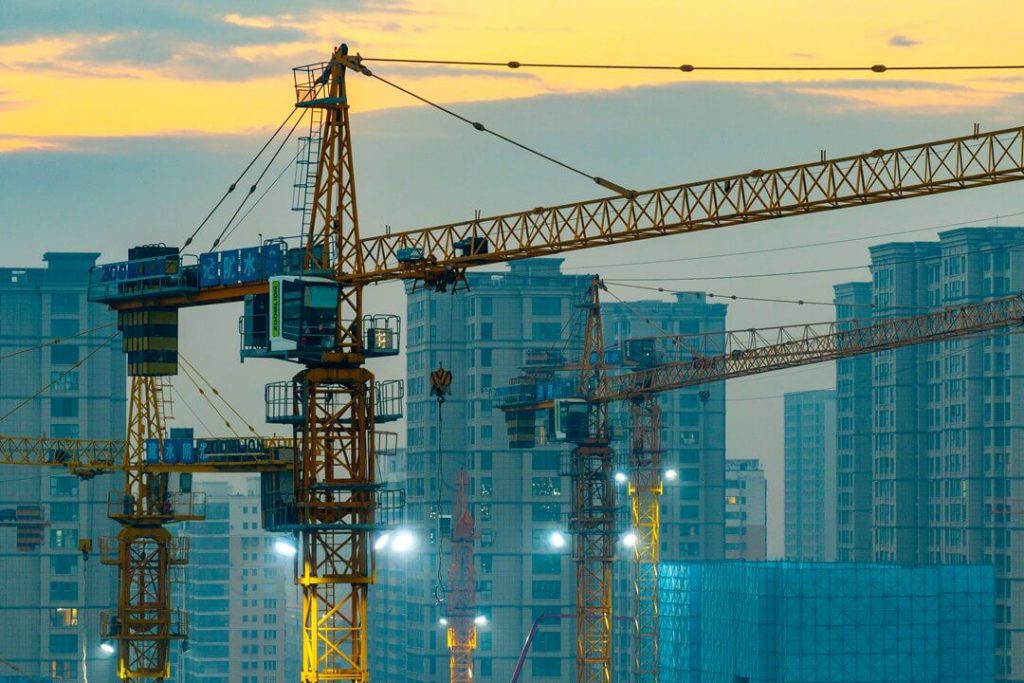In Depth: China Intensifies Efforts to End Property Crisis
By Zhu Liangtao, Chen Bo, Liu Ran and Qing Na


China’s property sector has shown little sign of climbing out of its protracted slump despite a series of measures issued over the past year to provide financial support for real estate developers and kick-start demand for new homes.
The continuing malaise led policymakers and regulators to ramp up their efforts in November, with more initiatives to channel funding to cash-strapped property developers with the aim of enabling them to complete existing projects. Their efforts intensified in January this year with further measures from the central bank and the top financial regulator, some in coordination with the housing ministry.
In the latest move, the People’s Bank of China (PBOC) and the National Financial Regulatory Administration (NFRA) issued a joint notice on Jan. 24 encouraging banks to provide loans to eligible developers using their commercial property assets as collateral. The loans can be used not only for the operational needs of those commercial properties but also to pay down loans taken out to build them.
In addition, quality developers will, up until the end of 2024, be allowed to use such loans to repay existing real estate loans or bonds owed by themselves or their holding groups, the notice said.
The announcement “is a significant step from the regulators to enhance credit support for developers,” economists at UBS Group AG led by Wang Tao wrote in a Jan. 25 research note. The latter measure “opens a new way for developers to fund their general debt service, especially those related to troubled projects (including residential), reducing the risk of further large-scale defaults,” they wrote.
“That said, the pace and potential size of such loans remain uncertain as banks will likely watch the commerciality and risks of such loans,” they said, adding that a fundamental and sustainable improvement in developer financing will need property sales to stop falling and start recovering and that could require more policy effort to stabilize the property market.
Reasonable financing needs
The notice followed an announcement by the NFRA and the Ministry of Housing and Urban-Rural Development on Jan. 12 that they were setting up a financing coordination mechanism for the property sector to improve communication between local governments, financial institutions and developers.
The new mechanism aims to help the parties come up with a list of projects eligible for financing and implement a decision made in October at the twice-a-decade Central Financial Work Conference that the “reasonable financing needs” of property developers must be met.
Xiao Yuanqi, a deputy head of the NFRA, told a press briefing on Jan. 25 that accelerating the implementation of the coordination mechanism would be a priority in the near future. “[We will] ask banks to take action as soon as possible,” he said, adding that the administration would call a meeting shortly to tell local governments to implement city-specific measures.
These latest steps follow a raft of measures released in November, including guidance for banks to boost lending to property developers.
The PBOC, the NFRA, and the China Securities Regulatory Commission held a meeting with banks and other financial institutions on Nov. 17, emphasizing the need to ensure that the “reasonable financing needs” of real estate developers were met, regardless of whether they were state-owned or private. Property companies operating normally should be given equal treatment and not have their loans called in, or be denied loans, while privately owned ones should be supported in issuing bonds, according to a statement from the PBOC.
The lending guidance introduced during the meeting included three requirements, dubbed the “three no-lower-thans,” telling banks to ensure their real-estate loan growth rates match or exceed certain benchmarks, banking sources with knowledge of the issue told Caixin.
Lack of clarity
Individual banks should ensure that the growth of their loans to the real estate sector is no lower than the banking industry average for the sector; that the growth rate of their loans to non-state-owned real estate companies is no lower than the growth of their overall developer loans; and the growth of individual mortgages on properties sold by non-state-owned developers is no lower than the growth rate of their overall mortgage lending.
After the meeting, more than 10 major banks, including Agricultural Bank of China Ltd. (601288.SH +1.29%), China Construction Bank Corp. (601939.SH +1.17%), Bank of Communications Co. Ltd. (601328.SH +0.84%), Industrial and Commercial Bank of China Ltd. (ICBC) (601398.SH +0.58%) and Postal Savings Bank of China Co. Ltd. (601658.SH +0.21%), held talks with leading property developers, according to a list compiled by China Index Holdings Ltd. The companies included China Vanke Co. Ltd. (000002.SZ +0.53%), Longfor Group Holdings Ltd., and Midea Real Estate Holding Ltd.
But the implementation and effectiveness of the government’s measures have been called into question over the lack of clarity over targets and the absence of detailed implementation guidelines, bank officials and real estate executives told Caixin.
“It’s not yet clear how we can implement the ‘three no-lower-thans,’” an official at the head office of a major bank told Caixin, saying that the lender is unsure if regulators will issue more-detailed rules and set out how assessments of banks’ compliance will be carried out.
Several bank insiders told Caixin that the requirements are seen as more of an indication of regulators’ intent rather than actionable directives.
“Banks have taken steps to respond, although so far, it’s all largely on paper,” an insider familiar with the matter at a state-owned bank told Caixin, noting that on the ground, lending practices and risk appetite have not changed.
A real estate industry analyst at a brokerage firm said that the policy faces “significant” implementation challenges. “We haven’t seen any evidence that anything has changed at the local branch level. The policy seems to be stuck at the headquarters level. Credit to the real estate sector hasn’t changed much … and at-risk developers are lucky if banks don’t call in their loans these days.”

White lists
Sources at several bank branches told Caixin that concerns over default risks and issues regarding accountability for lending decisions have been widely expressed among banks, given the continued depressed state of the real estate industry.
“Everybody is confused,” an official responsible for real estate business with a major bank said. Banks are reluctant to act until they get clarification on whether they will be liable if loans granted to private developers turn sour, the official said.
In China, regulations require bank loan officers to exercise due diligence when granting loans, and they could face penalties if a borrower defaults. For real estate loans, developers can only apply if they can provide a minimum of 35% of the required investment in the project with their own capital.
Lenders are also waiting for the authorities to issue their long-rumored white list of property developers who will get priority for loans. There has been no official announcement about such a list, but its preparation has been widely reported by Chinese media and real estate commentators.
An official at a major state-owned lender told Caixin that regulators are still evaluating the scope of the white list, but there are concerns that developers who fail to make the list will find it even more difficult to get loans.
Several banking insiders said a white list would basically hold regulators up as guarantors of the creditworthiness of the companies included, and that concerns about who would be held accountable in the event of a default would need to be addressed.
Implementation of any white list increases the danger that the risks and negative sentiment toward real estate will be transmitted to the banking sector, analysts at consultancy China Real Estate Information Corp. (CRIC) wrote in a November report. The nonperforming loan (NPL) ratio for real estate developers has been steadily increasing — at ICBC, the country’s largest bank by assets, the ratio rose to 6.68% at the end of June 2023 from 2.32% at the end of 2020. Should banks expand real estate lending based on the “three no-lower-thans,” NPL ratios could continue to rise, further damaging banks’ profits.
Ownership
One of the aims of the new policy is to push banks to give private developers equal treatment with their state-owned peers. Developers with different ownership structures have long been treated differently when it comes to financing. Before 2020, this was reflected mainly in higher interest rates on loans, but since the “three red lines” policy started that year and the industry slumped, the discrimination has also manifested itself in the amount of financing they receive, according to a report by the National Institution for Finance and Development (NIFD) in November.
Statistics from the NIFD show that from 2019 to the first half of 2023, cash inflows from financing activities among listed state-owned developers were relatively stable, while those of their privately owned peers slumped from an annual average of 1.6 trillion yuan ($237.1 billion) between 2019 and 2021 to 427.1 billion yuan in 2022, and dropped to 133.4 billion yuan in the first half of 2023.
Difficulties in securing long-term financing have led to a rise in short-term borrowing among private developers, increasing their risk profile. In the first half of 2023, short-term interest-bearing liabilities accounted for 62.6% of total interest-bearing liabilities among private developers, compared with 21.2% for central government-owned developers and 17.7% for local state-owned companies, according to a CRIC report in September covering 69 major listed developers.
At the Jan. 25 news briefing, NFRA’s Xiao reiterated the regulator’s commitment to treating developers equally regardless of ownership, adding that China’s banks had extended property development loans totaling 3 trillion yuan in 2023, putting the outstanding value of the loans at 12.3 trillion yuan.
Xiao also emphasized that the measures introduced on Jan. 12 will be implemented equitably and said that local governments will provide lists of property development projects eligible for financing to local financial institutions.
Read also the original story.
caixinglobal.com is the English-language online news portal of Chinese financial and business news media group Caixin. Global Neighbours is authorized to reprint this article.
Image: Kenishirotie – stock.adobe.com
